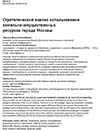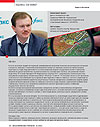Keywords: ,
,
,
,
,
,
,
,
The article examines the subject of research, focused on the study of economic and organizational relations and processes associated with the management of the investment value of land for residential development of the territory at the stage of land development based on the application of public-private partnership models. The relevance of this problem is related to the importance of solving the goal of increasing the commissioning of housing according to the message of the President of the Russian Federation to the Federal Assembly of 2018, which provides strategic plans for the transition from an average annual input of 80 to 120 million square meters. This is possible only through the use of economic tools for forecasting and managing the investment value of land. The purpose of the study is to develop conceptual theoretical and methodological and practical models for assessing and managing the investment value of land plots at the stage of land development in relation to housing construction with the priority of integrated development of territories on the basis of optimization of public-private partnership. As the applied research methods, a set of systemically interconnected methodological approaches based on the application of the theory of appraisal activity, economic and mathematical modeling, technical and economic, logical analysis, as well as the theory of risks, expert assessments, situational analysis and forecasting were used. The article shows both the author’s methodology and the results obtained that allow to simulate the management processes of the investment value of projects of the complex residential development of the territory to transfer it from negative to positive. Such management decisions are recommended to be carried out on the basis of the multivariate parameters of public-private partnership in relation to the performance of technical conditions, the volume of participation in social facilities, the transport and engineering infrastructure of construction. Ultimately, the article demonstrates the value of the completed studies both from the standpoint of the development of theory and methodology in the field of valuation theory applied to the category of “investment value”, and for the scientific and practical development of public-private partnership processes in the field of managing the increase in housing commissioning for corporate investment management and bodies of state and municipal management.
Продолжить чтение





